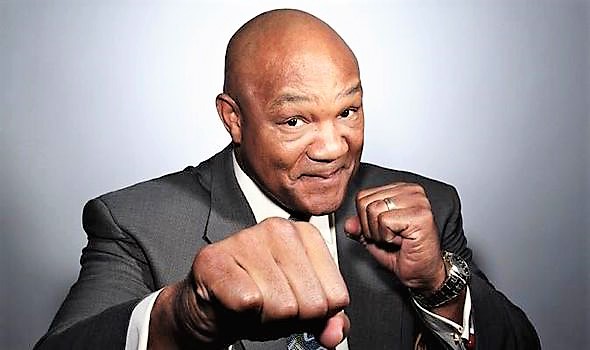Two-time world heavyweight champion and Olympic gold medalist George Foreman is a boxing legend. He has duked it out in the ring with the likes of such heavy-hitters as Muhammad Ali and Joe Frazier.
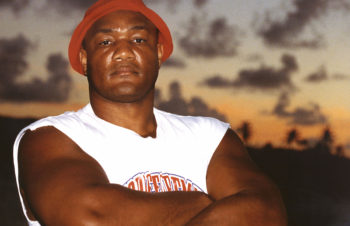 The rags-to-riches trope might sound cliché but, for Foreman, it is one that is grounded in reality. Once a street thug and mugger in Houston’s Fifth Ward, Foreman chose to punch his way out of his poverty-stricken existence using determination and grit. The man who is now so affable, approachable and loved worldwide was hated once-upon-a-time because he was ornery, rude, and a real curmudgeon in every sense of the word. Foreman was the mean-mug boxer poster boy.
The rags-to-riches trope might sound cliché but, for Foreman, it is one that is grounded in reality. Once a street thug and mugger in Houston’s Fifth Ward, Foreman chose to punch his way out of his poverty-stricken existence using determination and grit. The man who is now so affable, approachable and loved worldwide was hated once-upon-a-time because he was ornery, rude, and a real curmudgeon in every sense of the word. Foreman was the mean-mug boxer poster boy.
In 1977, however, Foreman had a religious epiphany, and the glowering punching machine suddenly turned in a huggable and kind bear whom everyone loves. The man who had never been very religious before experienced an awakening that was so life-changing, he turned his life over to God by becoming an ordained minister.
In 1987, Foreman, who was 38, shook up the boxing world by announcing he wanted to return to the ring after being away for ten years. The heavy-hitter managed to win several victories proving that age was not an issue in the ring. By the time he was 48, Foreman had fought his last bout, but he would go on to become a champ in the business world by becoming the face of the George Foreman Lean Mean Fat-Reducing Grill which was introduced in 1994. Taking on the promotional gig paid off sweetly as he is reported to have raked in over $200 million on the venture; more than he earned throughout his boxing career.
The now 69-year-old father of 10, who has five sons named after him, and who has been married to his fifth wife, Mary Joan Martelly, since 1985, is getting his second wind but not in boxing. He is co-starring on the NBC-TV hit traveling reality show, Better Late Than Never. Foreman and his globetrotting co-stars, Henry Winkler, Terry Bradshaw, William Shatner and Jeff Dye set off on zany adventures throughout the world as they attempt to immerse themselves in the culture, customs, and traditions of each new destination.
Here, in a two-part interview, the man whom many refer to as “Big George” let his hair down, so to speak, and openly discussed with 50BOLD his downs, ups, downs, and then ups again.
50BOLD: We don’t know a lot about your childhood. Tell us about your parents, siblings, where you grew up and about life in the Foreman household.
Foreman: I come from a family of seven. I am number 5, of 7 kids. I was raised by my mom. My mom and dad broke up early. My mom had an iron fist, and she tried to keep me out of trouble. My dad, I only saw occasionally.
We were poor, but when you say poor, I think everyone back in the forties and fifties were poor, so it was a normal life, I guess. I started to get into a lot of trouble as a young teen because I didn’t have full-time supervision. I joined Job Corp when I was 16 because I was getting into a lot of trouble and here is where I learned how to box, along with learning vocational skills. I earned my GED by way of Job Corp.
50BOLD: Your love of sports started with football.
Foreman: Yes, that’s true I always wanted to be a football player. The first football game I saw, at that time, was with Johnny Unitas of the Baltimore Colts. And then after seeing Jim Brown running for a touchdown, I knew right then and there that I wanted to be a football player more than anything in the world. The only thing with football is that you had to go to school; I was handicapped in this area.
50BOLD: Why do you say that?
Foreman: I would go to class just to join the football team. I had to keep going to class, but I wouldn’t go to school. I didn’t like school; I never did. I thought school was for someone else, never for me. It was hard for me to learn. Come to find out, since I did not have enough to eat, I couldn’t focus. I was just hungry. My mom would sometimes scrape up enough money to give us a school lunch. But for the most part, there was no lunch.
I also had a chip on my shoulder and all of that.
50BOLD: Why do you say, you had a chip on your shoulder?
Foreman: Hungry. I was hungry all the time. It seemed my whole life, I was being deprived of everything. My sisters and I were in the same boat, but they loved school. If I really wanted to and loved going to school, I could have made it. School just wasn’t important to me.
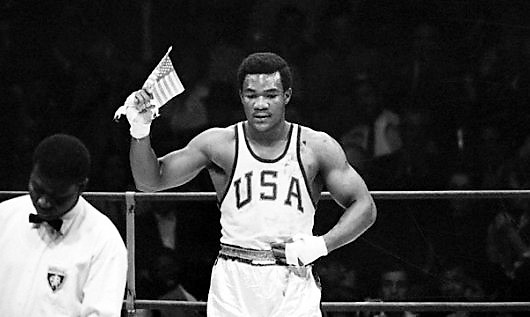 50BOLD: So school wasn’t for you at that time?
50BOLD: So school wasn’t for you at that time?
FOREMAN: At that time it wasn’t for me. The only regret I have in my life is that I didn’t follow in the footsteps of my sisters to get a high school education and to stay in school. You never get over this.
However, with my ten kids, I have been so hard on them. I have pushed them all through college. Pushed them! They never understood why high school diplomas and college degrees were so relevant to me. Some of my kids have Master’s degrees; one will receive a doctorate.
50BOLD: Let’s talk about your boxing career. In your amateur career, you went on to win the gold medal at the 1968 U.S. Summer Olympics. During this particular Olympics, sprinters John Carlos and Tommie Smith stirred controversy when they raised their fists in the air as a sign of Black power solidarity. Did you get to meet and discuss the incident with them?
Foreman: We were all teammates. John Carlos and Tommie Smith were real celebrities. They were the real heroes of the ’68 Olympics. I use to see them laying out on the field joking and jiving around, then go out and break a world record.
Around this same time, this guy from UCLA Berkley, Dr. Harry Edwards would say, “Whether you run, jump, or shuffle; as long as you’re doing it for the man. It’s no good!” And I remembered that as well. He got into the ear of a lot of those athletes, who were promising gold medals winners. He never talked to me because he didn’t think I was going to win anything, nor make it to the finals.
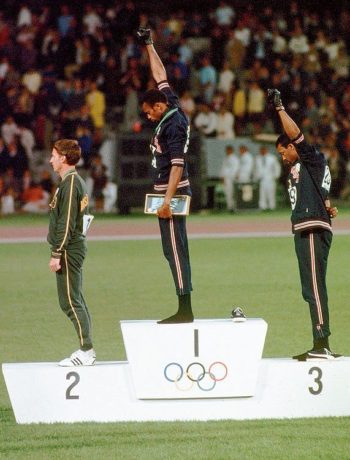
50BOLD: Did you think you could win?
Foreman: No, I was just a knockout artist. They didn’t even want me on the U.S. Olympic team because I did not have that “international” style. But the rules at the games were if you win, you proceeded on. No one could beat me because I would get these knockouts. However, I wasn’t an athlete who was approached. I remember, Lew Alcindor (Kareem Abdul Jabbar) in those days, deciding that he wasn’t going to the Olympics; O.J. Simpson was pressed to participate but couldn’t quite make it. So the celebrity-type athletes were approached regarding participating in the Civil-Rights protest, but never me. I didn’t even know what they were talking about.
50BOLD: So you were mainly off their radar?
Foreman: Basically under their radar. John Carlos and Tommie Smith were our roommates, and then we heard that they were being kicked off the team. It grieved everybody. We all cried about the situation.
50BOLD: That was a bad scene back then but they dared to stand up for their beliefs. Were you involved in the Civil Rights movement after the situation involving Carlos and Smith? Did the incident trigger you to get involved?
Foreman: No! As far as I was concerned that wasn’t anything to get involved with at the time. I’m telling you, back in the day, the Civil Rights movement was an intellectual movement.
50BOLD: Oh?
Foreman: It was. The movement took place on college campuses and universities and if you weren’t part of it, it would pass right over your head.
After I won my gold medal; I walked around the ring holding an American flag. There was a picture of me on the front page of the New York Post that stated, What so proudly he hailed. All of a sudden, George Foreman was a patriot. And once you get portrayed like this, it never goes away. And although I never got involved, or said anything, I was always painted as a guy who was patriotic.
50BOLD: Did you get a lot of flack from the Black community about this?
Foreman: I remember going home after the Olympics. I walked everywhere with my gold medal – it was a proud moment for me. I mean, I wore the gold off that thing! One day, a fella walked up to me and said, “George, how could you do what you did, when the brothers (John Carlos and Tommie Smith) were doing their thing?” I said WHAT! I was taken aback. I just started to remember the event that led me down the road to boxing.
It was 1965, and I had joined the Job Corp. Man, a few months before that I was mugging guys on the streets. And then one night, the police got behind us – I am not even sure if we were guilty that night. Anyway, I had crawled under a house to hide from the police. My friends who were running with me had disappeared, but the police were closing in on me. I crawled underneath the house. I don’t know how I got underneath that house, but I dug my way into the slop. It looked like the sewer pipe had busted, and there was waste water all over. I didn’t care. I was more afraid of those police dogs sniffing me out, then biting me.
Fast forward, less than two years later; I am standing on a platform listening to the National Anthem with a gold medal around my neck. You know, I wasn’t going to say anything bad about America. Those taxpayers got me fat and fine with a knockout punch. And I would never, even to this day, knock the American system. I am not going to do it!
50BOLD: You stood up for what you believed in?
Foreman: What else can I do? I didn’t go the Olympics as Black or white. I went to wear my colors. It was my first chance to wear red, white and blue. I wasn’t going to say anything. And to this day, I have never said anything negative about this country. And I hope to go to my grave like this.
50BOLD: Okay, I have another question regarding boxing. We now know about the health-related consequences of head trauma particularly with regards to specific sports. If a young person approached you seeking advice about a boxing career, what counsel would you offer?
Foreman: I would tell them my story about how, if the police had caught me that night underneath the house, after mugging someone, I would have had real trauma. I could have done twenty years in prison for what I was doing out there. Boxing was there for me.
Regarding head trauma: I got walloped a couple of times to the point where I heard bells ringing. It was like a siren calling me. And I would awaken out of it, so crazy, boxers were afraid of me. And if there’s anyone who would like to take a chance at becoming a champion fighter or athlete and was in the predicament that I was in, I would tell them…Man, go for it! Go for it!
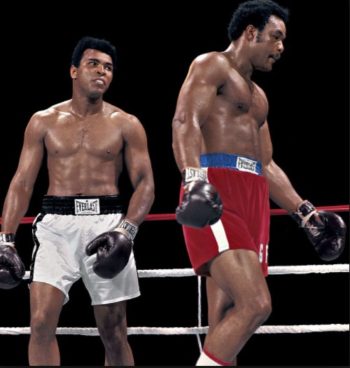
50BOLD: Was the “The Rumble in the Jungle” fight with Muhammad Ali your most memorable one? If so, why? If not, then which fight was one you’ll never forget?
Foreman: When say you memorable, I’d say maybe the Ali fight was the one everyone keeps asking me about. Year, after year, everyone wants to know, how did the fight happen?
There were times…I remember…when I fought a guy by the name of Ron Lyle; he would hit me so hard it didn’t even hurt! I was like a ragdoll on the floor, and I kept thinking if I don’t get up what excuse would I have. He would then knock me down again, and I’d just say to myself, “Man, I have to get up! Maybe I’ll just die because I can’t think of an excuse to stay down.” Now for me, the Lyle fight is the most memorable one because I’ll never forget that moment.
50BOLD: The Rumble in the Jungle was a classic fight. It was epic!
Foreman: You know, on that night, I had run into someone who had decided, you might be able to kill me George, but I am not going to lose!
You come face-to-face with a fighter like Ali, once in a lifetime. I became that type of fighter on my second time around in boxing. I had never faced anyone like Ali before; I would hit him so hard, knock him down but he would just say “I am not going anywhere, George.” I had never seen anything like it before or since. It was the toughest thing that ever happened to me in my life; I was sure that I would win that Ali fight in two or three rounds. I hit caught him in the third round, and then followed up with a barrage of punches. When the bell rang ending the round, he looked at me, looked around and said, “I made it. I made it.” I looked at him and said, yeah, he made it. We were both shocked!
*Check out part II of the George Foreman interview in the next issue of 50BOLD.com.


